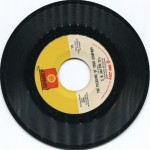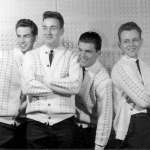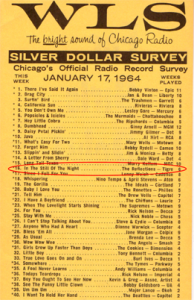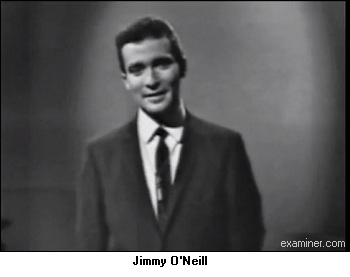My mom’s funeral is today. She was 96 and lived a long and rich life. She was a red-headed Irish woman that my dad always called a firecracker. She lived every day she wanted, pretty much the way she wanted it and when it was time to go left in dignity and peace. I will always remember the way I’ve written about her, a firecracker, but a sweet and supportive one. Below, is an excerpt about how my mom helped me at a crossroads in my young life.
FORTY-THREE YEARS ago on a cool and foggy September morning I’d sat with my sneaks in the gutter and my back against a bent and battered street sign in front of our house on Salem Street. The night before, near the beginning of my junior year at Shortridge High, an obsession to sing a certain song struck me like a firebolt direct-delivered from destiny. Despite a forced six months of piano lessons at fourteen my mom insisted every child should have, I’d shown no musical inclination or interest, let alone talent. Other than sports, and a compulsive and bewildering preoccupation with girls, high school had been a big disappointment and waste of time to me. From the moment I’d stepped through Shortridge’s massive, two-story entryway I sensed the danger of losing what nebulous adolescent identity I contained in the milling crowd of 2200 kids crammed together under those 18 foot ceilings. I’d struggled for two years to find my bearings. Homework was especially irritating. After school, I needed to be out looking for a pickup game, working on my jump shot, figuring out how to get taller, quicker, faster. Making the school basketball team in Indianapolis was the only sure way to recognition and acceptance. So far, I’d been hopelessly unsuccessful.
Last night on the radio though, while working on Spanish translations, the song I’d heard was so neat it captured my entire imagination. Tomorrow, I decided then, I’m going to learn how to sing that song.
This morning my plan of attack was to catch the Baldwin Brothers; Virgil, always called Ginko, and his brother Patrick, on their way to school. I’d chosen these neighborhood friends to help me sing this song without a clue of whether they knew how to sing or not. They didn’t, but after I put on a full court press to convince them on the short walk to school they agreed to try. And fortunately, they knew someone who did, and better yet he was in the Madrigal Singers, the school’s elite choir. When Hastings Smith Jr, agreed to help, the four of us would form my first singing group, the Aristocrats and my life would begin to change. I would meet the teenage dream girl who would eventually become my wife and I would finally feel, for the first time, that I’d find my own place in life to stand.
But before all that could happen, I needed to figure out a way to learn the song that possessed me. At first, during morning classes I hadn’t yet put the happy coincidence of my mom being in the record business together with my latest obsession, but before lunchtime, I realized I might have an ally.
“I need to find a song I heard on the radio last night, Mom,” I told her sitting in the kitchen in front of the formidable lunch she’d had waiting. I’d demolished my sandwich half, started in on the soup and was already eyeing the steamy bread pudding she’d just set out. Mom made the best puddings. “Anyway, since you work in a record store and all — would you help me find it?”
“Really?” She said, pulling up a kitchen chair and picking up her half of egg salad sandwich. “I didn’t know you liked music Larry.” This was always a special time for us when she fixed lunch for me, and we could talk together. Or, if she was busy, I could read one of my science fiction paperbacks, secure in her nearby presence.
“Oh it’s okay I guess. But I really just like this one song. I’m going to sing it with some of the neighborhood guys.” I looked up to see if Mom thought my idea was crazy. I always seemed to be off on some project or other, diverse as a registered Civil Defense club, outfitted by the US Government and the local army surplus store, prepared to protect our families from the imminent radioactive fallout whenever the Reds decided to bomb us, to organizing a pre-teen shoplifting operation, that had been nipped in the bud and got my behind stung.
“What‘s the name of the song?” Mom asked. “Do you know who the artist is who sang on the record? What kind of song is it? Some of this new music, the “rock and roll” style of music?”
“I’m not sure,” I said, considering her questions. “It was on the radio when I was doing my homework upstairs. Could be rock and roll I guess, but it’s kinda slow, so I’m not sure if that counts. I call it the Silhouettes song. I wasn’t paying too much attention to the radio because, you know, I was concentrating so hard on my Spanish,” I watched her eyes to see how that was going over. “So I missed the name of the song.
“But they kept singing ‘silhouettes, silhouettes,’ over and over again, so I think that’s gotta be part of the song’s name. It means,” I concentrated, ‘the outline of a solid figure as cast by its shadow’. I got the librarian to help me look it up during study hall. It’s not spelled the way it sounds you know, so I wrote it down for you.”
“Fortunately for you, I know what a silhouette is so you definitely came to the right mom,” she said, smiling. I grinned back. “And you probably don’t know the song’s label either?” No, I didn’t. This was getting complicated but I remained determined. “But you did hear the record on the radio so we can assume it must be popular,” she considered for a moment.”Come by the record store after school and we’ll see what we can find. Now finish up your pudding and get back to school on time.”
My mom had begun working at the 34th Street Record Shop record store a few weeks before I’d heard the Silhouettes song. I thought it was odd, and a little unsettling for her to leave the house to go someplace to work back then, even though it was a block from home and part time. Maybe we needed the extra money, it was about when Dad was deciding whether to open his own insurance agency or not. Whatever the reason she seemed to like working there.
“YOUR MOM SAYS you’re here to buy a recording this afternoon,” the lady in the flowery dress behind the counter smiled like she thought I was a little kid. “Your first, I think she said, is that right?” I nodded and so did she. A crisp, peppery smell permeated the store; posters and pictures on the walls displayed what I guessed were music people. “Well I’ll let your mother help you find what you’re looking for.” The woman swiveled toward the back of the shop.
“Ivy, I believe your good-looking young man is here for you,” she said. This was embarrassing. I wasn’t her good-looking young man; I was her son for Pete’s sake.
“Hi Larry,” said Mom,“ coming to the counter. It was strange to see her working in a shop. I wasn’t sure I liked it.
“Uh, hi Mom,” I said.
“Are you here to look for your record?” Well, yeah, I thought sarcastically. But I nodded, going along with everything. “Okay, well step over here, please.”
Mom came out from behind the long counter, past the cash register, and walked to where tables with pockets stretched to the front window. “These bins here,” she said pointing to a row of labeled folders holding recordings, “these are 78 rpm records I’ve been clearing out. See how they’re numbered from one to ten?” Yes, I could see that. “Well, these are the top ten most popular recordings of single songs as listed in Billboard Magazine. A lot of people want to buy what’s most popular at the moment, this way they can easily tell.”
“Is my Silhouettes song in there,” I asked eagerly.
“No, but here’s what’s interesting,” she said, showing me some empty folders stacked on the floor.” We used to display the top twenty-five 78 rpm records before I took these out to store in the back.” She pointed to where she’d been working.
“So my Silhouettes song is over there, then,” I said confidently.
“No no, it’s not in that stack either,” she said crisply, walking a little further along the row of bins. “Here are the new-style 45 rpm records. We only used to display the top ten 45 rpm records, but the other part of my job today was to add fifteen more folders so we can rack the top twenty-five single 45’s; that’s according to Billboard Magazine, of course. Do you know what that means, Larry?”
“My Silhouettes song is here?” I said hopefully.
“45 rpm single records are becoming more popular than 78 rpm records. That’s what it means,” Mom said with satisfaction. “And I think that’s a very interesting trend, don’t you?”
I stared at her. What could she be thinking? Did I miss something? Maybe there isn’t any Silhouettes record. “Crimalnitly, Mom, what about my record? Couldn’t you find the Silhouettes song?” I said, in horror.
“Well, let’s consider this for a moment. Now that the twenty five most popular 45 rpm records are in these bins,” Mom said, sounding a lot like one of my dumb teachers. “And since we don’t have any 78 rpm records with the word silhouettes in their title, maybe we can find your record in the 45’s.” She smiled at me, and hope was renewed. “I thought you might like to look.”
“Sure Mom, I’ll look,” I said as I rushed to sort through the records in the slots. “Here’s one, Singing the Blues”, nope, Party Doll, uh-uh” I muttered as I pawed down through Pat Boone, Elvis Presley, Debbie Reynolds, Buddy Holly until in the bin marked, number 11, I found it. “Silhouettes,” I reverently breathed out the oddly spelled word. ”By The Rays; on Cameo Records. Right here Mom. I found it.”
“Well, let’s make sure,” she said very professionally snatching the record in its pristine white paper sleeve out of my hand, and starting back across the store.
“But Mom,” I tried to point out trailing after her. “It does say Silhouettes you know, right there on the record.”
“Yes, but in here,” she said, opening the door to something like a public phone booth on the opposite wall. “You’ll know for sure because you can listen to your selection before you buy it. Lots of songs might have the word silhouettes in them; it is kind of a romantic word, don’t you think?” She smiled and drew me into the booth. She slipped headphones over my ears and all the sound in the world disappeared. I glanced up to see her put the record on a turntable, and it’s arm descended silently onto the vinyl plastic. A scratching sound like a hamster might make, broke the deafening silence, and then my Silhouettes song began playing, sounding better — much, much better than on the radio. I stared up at Mom. She was watching my surprised grin. She was enjoying herself, and that made me smile even wider.
 “I remember my mother watching your show when I was a child. Those songs are still in my head as an adult. I would like to know who sings “I’d Like to Have the Pleasure of Your Company” and what year was it released? Thank you — Veronica, via Facebook
”
“I remember my mother watching your show when I was a child. Those songs are still in my head as an adult. I would like to know who sings “I’d Like to Have the Pleasure of Your Company” and what year was it released? Thank you — Veronica, via Facebook
”


 DON”T MISS IT. Tonight The Sixties on CNN, 9 pm (EST), 6 pm (PDT), plus there are usually several re-runs. Covers the war from its beginnings through 1968. The face of war changed forever with this escalation. Combined with the pictures that brought the brutality of the war to the home front, a new sense of power and disenfranchisement from the country’s youth, and the hangover from the loss of a young and popular president, the support for this war faded as the commitment to it by the government went up. Up until this war, as Bill Murray exhorts his army buddies it in Stripes, “We’re 10 and 1!”
DON”T MISS IT. Tonight The Sixties on CNN, 9 pm (EST), 6 pm (PDT), plus there are usually several re-runs. Covers the war from its beginnings through 1968. The face of war changed forever with this escalation. Combined with the pictures that brought the brutality of the war to the home front, a new sense of power and disenfranchisement from the country’s youth, and the hangover from the loss of a young and popular president, the support for this war faded as the commitment to it by the government went up. Up until this war, as Bill Murray exhorts his army buddies it in Stripes, “We’re 10 and 1!”







 It with deep regret that I read in this morning’s LA Times that Jimmy O’Neill had passed on at 73. Only a couple of weeks ago I posted a story about Jimmy, how he was our personal manager from early 1967 into 1968. He introduced us to Eddie Cobb of the Four Preps who became our first producer, and Seymour Heller, who became our personal manager after Jimmy. Jimmy’s partner was Burt Jacobs who after managing us with Jimmy, went on with Bill Uttley and Reb Foster to form and manage Three Dog Night. Jimmy’s second wife, Eve Johnson, was with him when we met him. It was a difficult time for him, he never quite recovered from the cancellation of his TV show Shindig! I’m sure I speak for all my bandmates of 1967-68 when I send condolences to his children and the hope that he rest in peace.
It with deep regret that I read in this morning’s LA Times that Jimmy O’Neill had passed on at 73. Only a couple of weeks ago I posted a story about Jimmy, how he was our personal manager from early 1967 into 1968. He introduced us to Eddie Cobb of the Four Preps who became our first producer, and Seymour Heller, who became our personal manager after Jimmy. Jimmy’s partner was Burt Jacobs who after managing us with Jimmy, went on with Bill Uttley and Reb Foster to form and manage Three Dog Night. Jimmy’s second wife, Eve Johnson, was with him when we met him. It was a difficult time for him, he never quite recovered from the cancellation of his TV show Shindig! I’m sure I speak for all my bandmates of 1967-68 when I send condolences to his children and the hope that he rest in peace.
